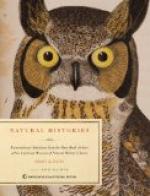On the ground the Orang always goes laboriously and shakily on all fours. At starting he will run faster than a man, though he may soon be overtaken. The very long arms which, when he runs, are but little bent, raise the body of the Orang remarkably, so that he assumes much the posture of a very old man bent down by age, and making his way along by the help of a stick. In walking, the body is usually directed straight forward, unlike the other apes, which run more or less obliquely, except the Gibbons, who in these, as in so many other respects, depart remarkably from their fellows.
The Orang cannot put its feet flat on the ground, but is supported upon their outer edges, the heel resting more on the ground, while the curved toes partly rest upon the ground by the upper side of their first joint, the two outermost toes of each foot completely resting on this surface. The hands are held in the opposite manner, their inner edges serving as the chief support. The fingers are then bent out in such a manner that their foremost joints, especially those of the two inner-most fingers, rest upon the ground by their upper sides, while the point of the free and straight thumb serves as an additional fulcrum.
The Orang never stands on its hind legs, and all the pictures representing it as so doing are as false as the assertion that it defends itself with sticks and the like.
The long arms are of especial use, not only in climbing, but in the gathering of food from boughs to which the animal could not trust his weight. Figs, blossoms, and young leaves of various kinds, constitute the chief nutriment of the Orang; but strips of bamboo two or three feet long were found in the stomach of a male. They are not known to eat living animals.
Although, when taken young, the Orang-Utan soon becomes domesticated, and indeed seems to court human society; it is naturally a very wild and shy animal, though apparently sluggish and melancholy. The Dyaks affirm that when the old males are wounded with arrows only they will occasionally leave the trees and rush raging upon their enemies, whose sole safety lies in instant flight, as they are sure to be killed if caught.
But, though possessed of immense strength, it is rare for the Orang to attempt to defend itself, especially when attacked with firearms. On such occasions he endeavors to hide himself, or to escape along the top-most branches of the trees, breaking off and throwing down the boughs as he goes. When wounded he betakes himself to the highest attainable point of the tree, and emits a singular cry, consisting at first of high notes, which at length deepen into a low roar, not unlike that of a panther. While giving out the high notes the Orang thrusts out his lips into a funnel-shape; but in uttering the low notes he holds his mouth wide open, and at the same time the great throat bag, or laryngeal sac, becomes distended.
According to the Dyaks, the only animal the Orang measures his strength with is the crocodile, who occasionally seizes him on his visits to the water-side. But they say that the Orang is more than a match for his enemy, and beats him to death, or rips up his throat by pulling the jaws asunder!




